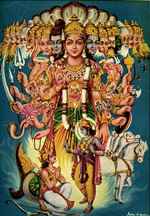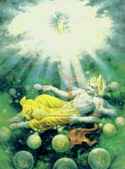Hinduism Creation Theory 
HISTORY
Hinduism began in India about 1500 B.C. The word Hindu came from the Sanskrit word sindu, meaning river and Indus. The Hindus define their community as "those who believe in Verdas". Hinduism is a major world religion with over 700 million followers. It has had a profound influence on other religions during its history, which dates back from about 1500 B.C.
CREATION THEORIES
Hindus believe that the universe is a great, enclosed sphere. The universe is a cosmic egg and contains many concentric heavens, hells, oceans, and continents. India is the center of this universe. Hindus also believe is an important aspect of their religion and it goes from the golden age (Krita Yuga), then to the present age (Kali Yuga). In between the two phases are intermediate periods of decreasing goodness. They also believe time is cyclic; at the end of each Kali Yuga, the universe is destroyed by flood and fire and a new golden age is begun. This cycle is also the foundation for their belief in karma and samsara, which is the rebirth system (Encarta online).
The doctrine of atman-brahan reads that Hindus should believe in an uncreated, infinite, eternal principle. The sole reality is the non-being self and the ultimate cause and foundation source of all existence. This reality is called Braham. Braham is "The All" and causes the universe to emanate from itself. Braham is in all things and is the self of all living beings. It is the creator, transformer, or preserver of all things. It is also the reabsorber of all things. Brahman is the being and is conceived of being a personal high god. This fundamental belief of Hindu in the religious search for ultimate reality has continued almost unaltered for more than 30 centuries. The Vedas followers also believe the earth was created by creatio ex hilo, which means a creation out of nothing.
In a canonical text in the Hindu bible, the Purinas section contains a topic about the creation of the universe. According to this text, Brahman projects the universe out of itself. Brahman ultimately becomes the universe and after creation, the universe rests in him. Also, Brahman is the pure intelligience of all things and appears as the universe of name and form without itself undergoing any change. This belief is called maya. One verse in Mundaka Upanishad (1.i.8) says that Brahman produced the world from matter, which then produced the mind and all other things. This verse means that Brahman alone exits in the world. Under the influence of maya, Brahman is the desire for creation and has the power to create, preserve, or destroy the universe.
Another theory that some Hindus follow is the ajata vada theory of non-casualty. This theory is found in an ancient Hindu doctrine that states that the creation of the world never really happened at all. It is a complete denial of all casualty in the physical world. This view holds that nothing ever comes into existence because the self (man) only exists alone. This unchanging reality correlates that time, space, and the universe are essential components of all creation theories, but the exist only in our minds.
Many followers of the Hindu religion believe that reality and creation are apart of one another.
The Hindu god: Brahman 
|